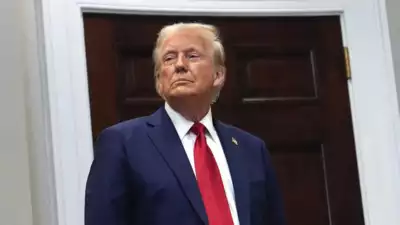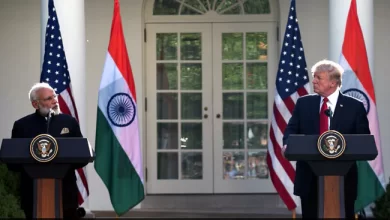
Trump urges Saudi Arabia and OPEC to cut oil prices to end Russia-Ukraine War — What it means for global
At the World Economic Forum in Davos, Switzerland, U.S. President Donald Trump made bold remarks that could reshape the global energy landscape. Speaking via video link, Trump urged Saudi Arabia and the broader Organization of the Petroleum Exporting Countries (OPEC) to lower oil prices, claiming this move could bring the Russia-Ukraine conflict to an immediate halt. His comments highlighted a clear connection between high oil prices and the ongoing war, with Trump expressing frustration that oil-producing nations had not acted sooner.
Why is Trump Asking Saudi Arabia and OPEC to Cut Oil Prices?
Trump’s comments come amid rising global tensions and economic pressures caused by the ongoing Russia-Ukraine war. According to Trump, the high price of oil is fueling the conflict, as Russia benefits from higher revenues, which allow it to sustain its military operations. Trump stated, “If the price came down, the Russia-Ukraine war would end immediately. Right now, the price is high enough that that war will continue.” By reducing oil prices, Trump believes OPEC, particularly Saudi Arabia, could help cut off Russia’s financial lifeline, potentially forcing a ceasefire or end to the war.
The Strategic Importance of Oil in Global Geopolitics
Oil is a crucial factor in global geopolitics, and its price can have wide-reaching implications. Trump’s call for Saudi Arabia to lower oil prices not only targets Russia but also signals a shift in U.S. energy policy. Trump, who has repeatedly advocated for American energy independence, also stressed the importance of using the U.S.’s vast oil and gas resources to strengthen its economy. He remarked, “The United States has the largest amount of oil and gas of any country on Earth, and we’re going to use it.”
The US president’s assertion that lowering oil prices could end the war also reflects his broader strategy to leverage energy markets to influence global conflicts. With Saudi Arabia and other OPEC members holding significant sway over oil production, Trump’s pressure on them to adjust prices could further complicate relationships within the energy market.
A Trillion-Dollar Investment Deal with Saudi Arabia
In addition to his call for lower oil prices, Trump also sought to increase the size of Saudi Arabia’s planned investment in the U.S. economy. Originally set at $600 billion, Trump pushed for this figure to be raised to $1 trillion. He described Crown Prince Mohammed bin Salman as a “fantastic guy” and emphasized the potential for mutual prosperity through increased investments. This investment package, which focuses on expanding trade and economic ties between the two nations, is seen as part of broader efforts to strengthen U.S.-Saudi relations, particularly in the face of the ongoing geopolitical challenges.
The Role of OPEC in Managing Global Oil Prices
OPEC, a powerful alliance of oil-producing countries, plays a key role in regulating global oil prices by controlling production levels. Since the pandemic, OPEC has been engaged in efforts to support oil prices by reducing output, a strategy designed to prevent oversupply in the market. However, these actions have been met with varying levels of criticism, with some nations, including the U.S., calling for an increase in production to address rising global energy costs.
Trump’s call to lower oil prices is not unprecedented. During his presidency, he repeatedly urged OPEC and other oil producers to lower prices to benefit the global economy and U.S. consumers. His remarks in Davos underscore his continued belief that OPEC’s actions have a direct impact on global stability and the economy, especially when oil prices reach levels that fuel conflict.
Could India Benefit from Lower Oil Prices?
India, as one of the world’s largest oil importers, stands to benefit significantly if OPEC, particularly Saudi Arabia, heeds Trump’s call to lower oil prices. A reduction in global oil prices would ease the country’s import bills, helping to improve its trade balance and reduce inflationary pressures. For a country with a growing economy, cheaper oil could provide much-needed relief to consumers and industries alike, lowering fuel costs and stabilizing prices across various sectors. Additionally, with India playing a key role in the geopolitical landscape, a shift in oil pricing could enhance its energy security and give it more leverage in global economic discussions, especially as it seeks to position itself as a major player in global supply chains.
The Impact on Oil Markets and Global Economies
Trump’s interventions in the oil market have the potential to influence both supply and demand dynamics. As the global market faces ongoing challenges from the war in Ukraine and sanctions on Russian oil, OPEC’s decisions will be closely watched. Saudi Arabia, as the largest oil producer in OPEC, holds significant power over the direction of global oil prices. If the kingdom and other OPEC members heed Trump’s call, it could result in a significant shift in global oil pricing structures.
However, the complexity of oil politics and the economic interests of OPEC nations may mean that such a change is unlikely without significant negotiations. Saudi Arabia, in particular, has its own economic and geopolitical considerations, including the desire to maintain stable oil prices for its own economic development.
The Geopolitical and Economic Implications of Trump’s Remarks
Trump’s comments at the World Economic Forum illustrate the delicate intersection of energy, geopolitics, and international relations. By urging Saudi Arabia and OPEC to cut oil prices, he is not only addressing the Russia-Ukraine war but also signaling a broader U.S. energy policy that prioritizes American interests while shaping global energy markets.
The potential for Saudi Arabia to increase its investment in the U.S. economy also reflects a desire for deeper economic ties between the two nations, even as they navigate the complexities of global energy politics. Whether OPEC will respond to these calls remains to be seen, but one thing is clear: Trump’s influence on the oil market is far from over.





